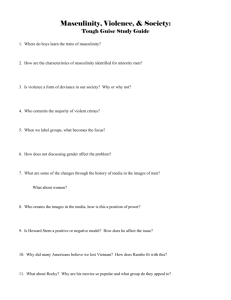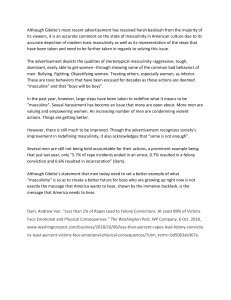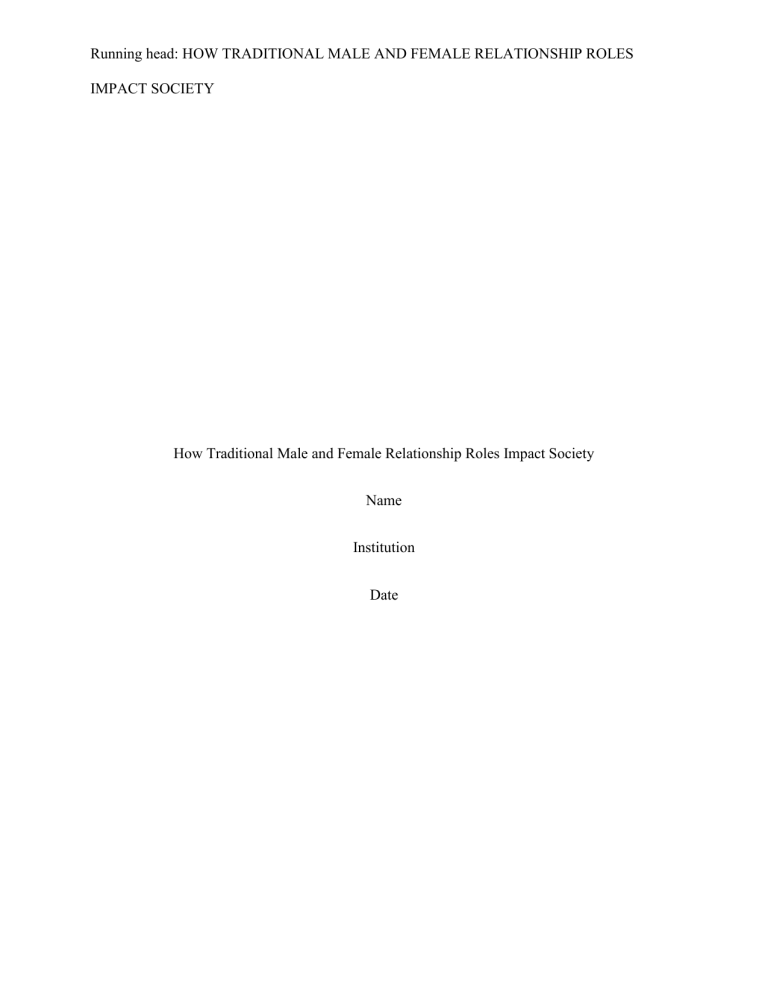
Running head: HOW TRADITIONAL MALE AND FEMALE RELATIONSHIP ROLES IMPACT SOCIETY How Traditional Male and Female Relationship Roles Impact Society Name Institution Date HOW TRADITIONAL MALE AND FEMALE RELATIONSHIP ROLES IMPACT SOCIETY 2 How Traditional Male and Female Relationship Roles Impact Society The traditional setting where men took up the role of providers within the family while women stayed at home and cared for the children seems to have gone through changes. Currently, women form part of the paid work force, and make vital financial contributions for their families. However, the traditional roles seem to impact society even with women empowerment. In fact, the importance of roles plays a part in determining the quality of romantic relationships. Further, the roles have implications with regard to stability and fulfillment within the marital setup. As Kaukinen, (2004) reports, different compatibility measures influence marital success. Aspects that facilitate the ability of both men and women to contribute towards the family’s economic welfare include education, employment, and income. Due to the traditional roles, such measures influence compatibility between marriage partners. The traditional marital setup exemplifies men as primary providers and hence well educated as contrasted against women. Due to status arrangements, husbands gained greater control while potentially placing wives at high risk for domestic violence. Additionally, the dependency of women in marriages also increased the possibility of women persevering in abusive marriages. Lack of resources in education, profession, and finance while burdened with a lopsided duty for children restricted their capacity to terminate brutal relationships (Kaukinen, 2004). The implication in society is that women's reliance on their husbands closely aligns with their classically lower earning power. To some extent, it forces them to depend on their partners to sustain their f living standards. Considering that men control the bulk of high-paying jobs in society, it trickles down to men commanding greater control in the marital setup. As such, status remains a fundamental issue in society regarding the compatibility of intimate partners. HOW TRADITIONAL MALE AND FEMALE RELATIONSHIP ROLES IMPACT SOCIETY 3 Nevertheless, modern times have caused changes and women stand equal chances of earning sizeable incomes. The result has been occurrence of marriages where status reversal manifests. However, due to the traditional roles, marriages where men earn less than their wives seem to be at a greater risk of domestic violence. As Kaukinen, (2004) asserts, a wife’s risk of severe violence increases where she has a job while her husband remains unemployed. Through her research, Kaukinen, (2004) suggests that where status reversal occurs in a relationship with the woman being favored resulted in incompatibilities. Due to the incompatibilities, some men feel threatened and have a higher likelihood of using emotional abuse as a way of asserting their dominance at home. Nevertheless, such men typically refrain from using bodily violence to subjugate their wives. In her study on black masculinity identity, Charleston, (2014) mentions that hegemonic masculinity offers the drive for men to subjugate of women. Consequently, hegemonic masculinity falls short in seeking alignment with the life of a real man. Rather, it corresponds to a construct that puts across the desires, fantasies, and ideals of a society pervaded by patriarchal values. Being strongly rooted in hegemonic masculinity, traditional roles influence men to maintain dissimilarities to women to the greatest extent. It also advocates for men to have full dominance over women while depicting responsibility and maturity. Charleston, (2014) points out that hegemonic masculinity requires men to hold power and property, while in total opposition to homosexuality. Nevertheless, black men, for one reason or another, fall short in reaching such ideals of masculinity. With the influence of traditional roles, it is probable that lots of people do not have adequate time, power, or will power to allow for the different ideals of masculinity to co-exist HOW TRADITIONAL MALE AND FEMALE RELATIONSHIP ROLES IMPACT SOCIETY 4 within a relationship. The effort put forth in enhancing patriarchal ideals exhaust the much needed energy to foster practices for enhanced relationships. Within the black community, there actually exists the expectation of conservative responsibilities that designate men as providers and protectors. Nevertheless, Charleston, (2014) notes that the elusiveness of openings that would allow for fulfillment of provider roles among black men acts to the hurt of relationships. The stress to perform the patriarchal part creates pressure and conflict for both parties. On the one hand, the man feels stressed for falling short while the woman maintaining rigidity in her demands feels stressed due to unfulfilled demands. While demonstrating the impact of traditional roles among Caribbean men, Lincoln, Taylor &Jackson, (2008) indicate that emphasis remains on educational, economic, and material success. In fact, the societal system of Caribbean Blacks largely receives credit for assisting their capacities to create niches in different economic sectors. Such systems extend to the financial assistance to facilitate other immigrant set up their establishments. In looking at the influences of traditional roles on courtship, Seal & Ehrhardt (2003) point out the expectation for men to initiate courtship. For the entire process, women seemed to shy away from initiating courtship but only gave hints. By complying with the traditional roles, the likelihood of a conflict decreased significantly. On the other hand, those who seek to deviate from traditional roles increase the possibility of conflicting interests among partners. As per the traditional roles, the men take charge of protecting their intimate partners or wives. It may even call for sacrifices on the husband’s part. From Joo and Park (2015), the tendency to sacrifice comes once identity fusion takes place over the course of time. The aspect of time pressure also acts as an influence on the impulsiveness by a man to sacrifice for his HOW TRADITIONAL MALE AND FEMALE RELATIONSHIP ROLES IMPACT SOCIETY 5 intimate partner. When tempted to make an impetuous choice, men seem inclined to succumb to automatic reactions. Joo and Park (2015) indicate that strongly fused partners depict the automatic reaction of becoming agents of action upon learning that their lover is threatened. Such persons’ conscious thoughts, including the prioritization of self-welfare, work rather as an enemy of eventual sacrifice. Below is an graphical representation from Joo and Park (2015). As depicted, weakly fused persons depict a tendency to prioritize personal safety regardless of the nature of the decision at hand. In view of the same, Joo and Park (2015) mention that when allowed sufficient time to reflect on their decision, the highly fused persons as well might consider the likelihood of a breakup, thus deterring them from making the ultimate sacrifice for their partner. In a study focusing on Latinos, Burke (2015) pointed out the effect of discrimination on mental health among partners. Since traditional roles require men to assert their position, HOW TRADITIONAL MALE AND FEMALE RELATIONSHIP ROLES IMPACT SOCIETY 6 discrimination worked against their favor. In fact, it positively associated with anxiety disorder, mood disorder, and substance abuse. Moreover, perceived discrimination associated with a rise in instances of depression among Mexicans. From the research, the prevalence of interracial couples experiencing bigotry seemed high, especially in public settings. As a result, such couples inclined towards isolating themselves and concealing their relationship from the public. In effect, it contributed to feelings of pain and frustration within the marriage setup. In conclusion, traditional roles greatly impact society with respect to intimate relationships between men and women. Right from courtship, the man is expected to take the lead while the woman follows suit. Within the marriage setup, reverse relationships occur and reflect the progress made in gender equality. While the expectation of a man to be the provider and protector still exists, women empowerment allows for women to gain financial security. To a great extent, men feel threatened by partners who earn more than and may actually result to emotional abuse to feel in control. Nevertheless, the need for intimate partners to read from the same script remains paramount towards a successful relationship. HOW TRADITIONAL MALE AND FEMALE RELATIONSHIP ROLES IMPACT SOCIETY 7 References Burke, J. L. (2015). Investigating Psychological Distress in Latino Romantic Relationships. Race, Gender & Class, 22(3-4), 172-194. Charleston, K. (2014). Act like a lady, think like a patriarch: Black masculine identity formation within the context of romantic relationships. Journal of Black Studies, 45(7), 660-678. Joo, M., & Park, S. W. (2017). Effect of identity fusion on decision to make extreme sacrifices in romantic relationships: The moderating role of impulsiveness. British Journal of Social Psychology, 56(4), 819-827. Kaukinen, C. (2004). Status compatibility, physical violence, and emotional abuse in intimate relationships. Journal of Marriage and Family, 66(2), 452-471. Lincoln, K. D., Taylor, R. J., & Jackson, J. S. (2008). Romantic relationships among unmarried African Americans and Caribbean blacks: Findings from the national survey of American life. Family relations, 57(2), 254-266. Seal, D. W., & Ehrhardt, A. A. (2003). Masculinity and urban men: Perceived scripts for courtship, romantic, and sexual interactions with women. Culture, Health & Sexuality, 5(4), 295-319.
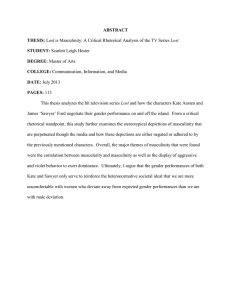
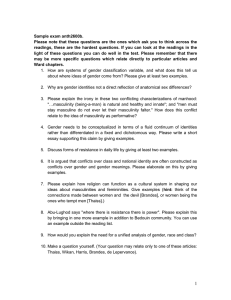
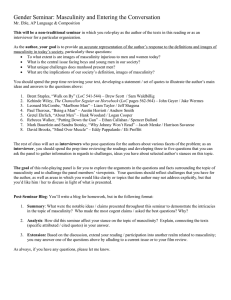
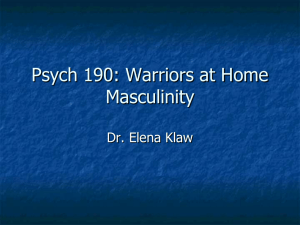
![C-SWIR Seminar Promo: 26oct2015 [DOC 143.50KB]](http://s2.studylib.net/store/data/014974093_1-9ff6fa79b7dfcfba164f1f275834567b-300x300.png)
